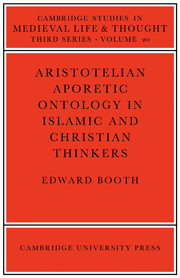Book contents
- Frontmatter
- Contents
- Preface
- Abbreviations
- 1 ARISTOTLE'S APORETIC ONTOLOGY AND THE RADICAL ARISTOTELIAN TRADITION
- 2 THE NEOPLATONIST INTERPRETATION OF ARISTOTLE'S ONTOLOGY
- 3 THE CHRISTIAN ARISTOTELIAN REACTION OF THE SIXTH CENTURY AND MONOTHEIST MODIFICATIONS TO THE NEOPLATONIST LEGACY
- 4 THE ARAB PERIPATETICS: AL-FĀRĀBĪ, IBN SĪNĀ AND IBN RUSHD; AND THE JEWISH PERIPATETICS: ABRAHAM BEN DAVID AND MOSES MAIMONIDES
- STASIMON: THE INTRODUCTION OF THE ‘NEW’ ARISTOTLE AND THE ARAB PERIPATETICS TO MEDIEVAL CHRISTENDOM
- Conclusion
- Appendix
- Bibliography
- Index
1 - ARISTOTLE'S APORETIC ONTOLOGY AND THE RADICAL ARISTOTELIAN TRADITION
Published online by Cambridge University Press: 05 November 2011
- Frontmatter
- Contents
- Preface
- Abbreviations
- 1 ARISTOTLE'S APORETIC ONTOLOGY AND THE RADICAL ARISTOTELIAN TRADITION
- 2 THE NEOPLATONIST INTERPRETATION OF ARISTOTLE'S ONTOLOGY
- 3 THE CHRISTIAN ARISTOTELIAN REACTION OF THE SIXTH CENTURY AND MONOTHEIST MODIFICATIONS TO THE NEOPLATONIST LEGACY
- 4 THE ARAB PERIPATETICS: AL-FĀRĀBĪ, IBN SĪNĀ AND IBN RUSHD; AND THE JEWISH PERIPATETICS: ABRAHAM BEN DAVID AND MOSES MAIMONIDES
- STASIMON: THE INTRODUCTION OF THE ‘NEW’ ARISTOTLE AND THE ARAB PERIPATETICS TO MEDIEVAL CHRISTENDOM
- Conclusion
- Appendix
- Bibliography
- Index
Summary
The ontology and noetic of Plato were a development of a possible explanation of the stable sameness of things; the ontology and noetic of Aristotle (384/5–322 BC) were the expansions of an insight which seemed to invalidate it. The overall tendency of Aristotle's reflections on ontology is clear: against the position of Plato that the objects of the material world are so many unreal things, separated from their transcendent paradigms, Aristotle asserted the complete independence of material things from any such world, and their independent existence from each other. His constant Plato-critique is a driving force behind his thought, tolerating the empirical attitude which he justified by an appropriate metaphysic. His writing sometimes confidently used Plato's vocabulary for situations which were quite un-Platonist; thus he wrote of a participation, which was by Platonist standards no participation, of εῖδος which was paradigmatic by being not transcendent but intrinsic; of containment (τὸ περιέχειν) of species (by genus) and individuals (by species) which were not contained; of universal wholes (τὸ καθόλου) which were not wholes; of substances (οὐσίαι) which by Platonist standards were not substances; and of dialectic which was mere argument. Without seeing the irony which underlay them, later Neoplatonists, eclectically seeking the reconciliation of Plato's with Aristotle's thought, found in these statements, which were intended to underline the divergences of his thought from Plato's, a possible means of their reconciliation.
- Type
- Chapter
- Information
- Publisher: Cambridge University PressPrint publication year: 1983



